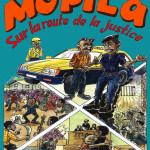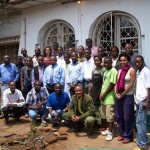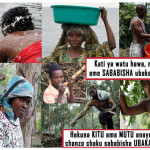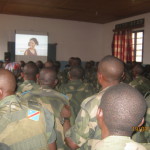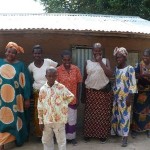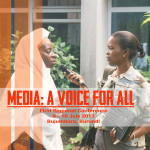Local Voices – Say No to War, Stay in Civilian Life
Deciding between an armed existence and civilian life is far from being a rhetorical question in a context where armed groups abound and the lack of economic opportunities erodes all thoughts of the future – as in rural North Kivu. Despite the numerous challenges which the civilians experience on a daily basis in the far-flung villages of North Kivu, the civilian population shows an extraordinary willpower, and capacity for resilience, when faced with the effects of armed violence and the surrounding poverty.
Through portraits and photographic testimonies, this publication looks at the civilians who share their daily lives with the armed groups; how they live and how they survive in an excessively militarized environment, and how they see their own existence surrounded by militiamen.
Young women and the rebels
They are aged between 16 and 20 and every day of their life they live with young men of the same age who bear weapons and fight. Some of the young single women who live in Lukweti, where the APCLS armed group set up its headquarters a few years ago, speak to us about armed men and their own individual concerns.
“I don’t want to marry a soldier (i.e. militiaman) because there’s a danger that he could go to fight and die there. I want an intelligent husband, a husband who would be able to earn enough so that we could live well.”
“There are lots of women who love the soldiers because they have a reputation for looking after their women properly. But we have seen how our older sisters who married soldiers became widows very quickly. To get by, some of them have even had to become prostitutes.”
“Life is hard in Lukweti. We have to keep fleeing because of the war. I would like to find a husband who could take me to Masisi town, or even to Goma, because there we could spend several years without ever hearing bullets fired.”
“The ideal man is a civilian because he won’t die too quickly, unlike a soldier. And if he does die, it will be from illness, or an accident, not because of the war.”
Living and Surviving
Predominantly based on small subsistence agriculture, life in North Kivu is particularly difficult economically. There is a cruel lack of opportunities for employment which means that cultivating the land often remains the only possibility of income for households. However local agriculture is barely profitable. Even if the land is fertile, the farmers are often prevented from accessing their fields by the insecurity caused by armed groups, and, even then, their harvests would be simply ransacked by the rebels or the soldiers from the national army.
The lack of roads is a huge barrier to the development of the local economy, slowing down (or entirely preventing) the transportation of farm produce to markets and possible sale locations. In such conditions, the local people limit themselves to growing the minimum necessary for their family – the uncertainties of war regularly reduce any investment back to nothing.
A man pushes his bicycle loaded with containers of banana liquor on the road between Lukweti and Nyabiondo, a road which becomes a huge impassable field of mud. Masisi territory, North Kivu, August 2013.
“We live a life of poverty because the road isn’t made,” said a young woman in Lukweti.
A woman comes back from the fields carrying a container of cassixe (banana beer) on her back and a child on her front. In Eastern Congo, woman are undeniably the driving force of the local economy. Katale, Masisi territory, North Kivu, June 2013.
“Life is very hard here in Lukweti. To get money, the only thing that we can do is to carry containers of Kasusu (locally brewed banana liquor) on our backs to Nyabiondo, which is a 3 hour walk. We get paid between 1000 and 1500 Congolese francs ($1-$1.5) for carrying a 20 litre container,” a young woman in Lukweti explained.
A child watching over a goat grazing.
As well as going to school (when parents have the money to send them), children have to contribute to the household’s coffers from a young age, in order to improve their living conditions.
Children work in the banana plantations, whilst also looking after their younger brother, still a baby. Lukweti, North Kivu, August 2013.
Fabrice, 20, goes to the banana plantations with his friends to brew banana beer. Fabrice is not the owner of the plantations, but he will be paid up to 2500 Congolese francs (about $2.5) for the day’s work. In this way he makes the most of the school holidays to make some savings to pay his registration fees at the Masisi School for the new school year.
Fabrice tells us “It’s not only with weapons that we can defend our country. If I finish my studies, I can become a politician and also contribute to the development of my country and bringing peace back here”.
Men cut bamboo in the Lukweti forest. Bamboo is used as a construction material, predominantly for roofing houses, but also to build bridges.
A woman plants manioc cuttings in her field. Lukweti, August 2013.
A game hunter poses with his homemade 12 bore rifle. Smoked bush meat (monkey, porcupine) is very prized in Eastern Congo. Many men in Lukweti hunt in the forest, and can leave for several days at a time to go hunting. They often cross the blockades set up by the FDLR Hutu rebels and have to leave them part of their spoils.
A seller in the Lukweti market. The Lukweti market takes place every Thursday and is a day of great activity in the village. Many people come in from the neighboring villages, particularly the FDLR armed men. All the merchandise arrives on the backs of men (and more often on the backs of women) from Nyabiondo, approximately a 3 to 4 hour walk. You can find everything in the market; clothes, sandals, pocket torches, and Chinese digital watches at 1500 Congolese francs (about $1.5).
Women loot manioc for the APCLS militia. Lukweti, Masisi territory, North Kivu, August 2013.
Sifting manioc flour for the APCLS militia. Lukweti, Masisi territory, North Kivu, August 2013.
Civilians and militiamen – how to live together?
Even if the possession of a firearm sets up a fundamental inequality between the militiaman and a civilian, that of a relationship of a superior over a second-in-command, the civilians and armed men are far from being strangers to one another. Among parents, friends, brothers, cousins and neighbors it is very rare, in the Masisi territory, to find a family which does not have a single member linked, either closely or distantly, to an armed group. The distinction between civilians and militiamen can sometimes be blurred, as civilians can sometimes have a weapon at home.
Members of the ‘youth’ of Lukweti with their President, in the khaki t-shirt. In many villages the young people are organized into self-defense groups, named ‘youth’ or ‘local defense’. Lukwety’s youth has some weapons and organizes patrols at night in case of attack, particularly when the APCLS militia have gone to the front line. The President of the Lukweti youth tells us that he can get almost 80 young people together, but they only have ‘a few weapons’.
A civilian and an APCLS militiaman greet each other warmly after not having seen each other for a long time. Lukweti, North Kivu, August 2013.
Sentiment, Chief Escort of APCLS’ “Colonel” James (in military uniform), celebrates his return from the front in Pinga with his friend Muhindo, a member of Lukweti’s youth. The two young men met some years ago in Kitchanga, Sentiment’s hometown, before Sentiment joined the APCLS. In Pinga, APCLS is regularly fighting Cheka’s troops.
A football match in Lukweti – the teams bring civilians and militiamen together around the football. Lukweti, North Kivu, August 2013.
Shaolin, a Lukweti resident, and Colonel Christian from the APCLS are great friends. Shaolin is not part of the APCLS but, nevertheless, he sometimes accompanies his friend Christian to the front line. Lukweti, North Kivu, August 2013.
Innocent is worried. His brother and four of his friends have been called by “General” Janvier to explain their involvement in a fanciful tale concerning minerals. Under escort, the five young men had to climb up Mt. Sinai where the APCLS commander is located. Innocent does not know what will happen to them. They were to be interrogated and lectured by the General himself, but did not experience any ill-treatment. They would stay at Mt. Sinai for four days, carrying out works for the “General” before they could return home.
Maman Mishé was married to Kalé, the elder son of “General” Janvier. Kalé had a reputation for being one of the most hardened APCLS militiamen. He died a year ago. Whilst he was on the front line during the fight against Cheka’s men, Kalé was caught in an ambush. His body was riddled with bullets.
Maman Mishé thinks about Kalé often. She dreams about him at night. They had one child, a boy. Mishé does not have fields. When Kalé died, her in-laws took her husband’s four cows as well as his goats and chickens. Today Mishé lives from running a small pork meat business, without anyone’s support.
Keep the faith
Confronted by the adversity of war and the surrounding poverty, the Christian faith and its promise of a better tomorrow undeniably provide a certain kind of comfort to the very devout population in North Kivu. The churches are full on Sundays. In Lukweti’s CEBECA Protestant Church, one Sunday in August, the pastor fervently preaches fire and brimstone at the top of his voice.
Apart from the religious aspect, churches are also particularly important social spaces for community life. There people meet as families, among friends and neighbors, and sing and dance for hours. Sometimes some militiamen also come to pray and gather their thoughts. Nevertheless, the pastor tells us ‘they don’t come often’.
The pastor maintains an impressive level of energy throughout his sermon, which lasts for two hours.
Many young mothers come to church with their children.
Although there is no electricity in Lukweti, the CEBECA church has a solar-powered drum kit from which the musicians can amplify their instruments and invigorate Mass with their songs.
Every good Christian has to contribute to the Church’s development. The basket is passed round for the faithful to put in several francs.
Men, women and children sing and dance. Mass is also a time to relax and be social.
A small girl plays outside the church waiting for the end of Mass. Lukweti, North Kivu, August 2013.
……………………………………………………………………..
Text and photographs: Alexis Bouvy.
Facilitation in the field: Chrispin Mvano and Rodolpe Mukundi.
Text translated from French by Alexandra Jackson.
For more information on the context of armed conflicts in North Kivu, see Jason Stearns (2012), North Kivu. The Background to Conflict in North Kivu, Usalama Project, Rift Valley Institute, Nairobi.
See also the International Alert report, including a critical perspective of peace actions carried out or supported by the Congolese authorities and international actors: Ending the Deadlock. Towards a New Vision of Peace in Eastern DRC.
Local Voices – Congolese Communities & The Kivu Conflict enjoys the support of International Alert and Search for Common Ground.
© Local Voices 2013 with International Alert & Search For Common Ground.

































